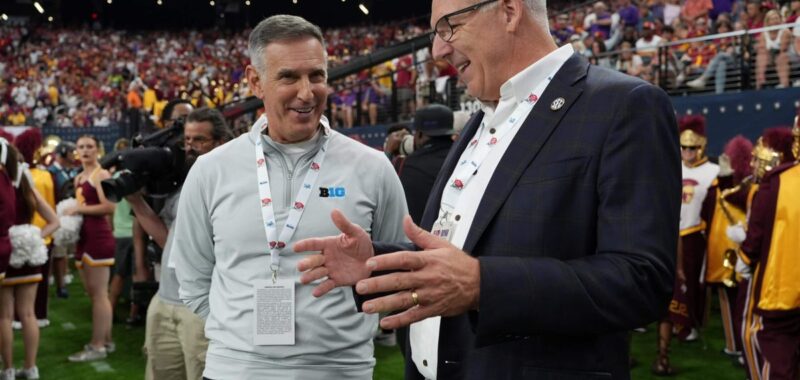NASHVILLE, Tenn. — Recent proposals by private equity firms investing billions of dollars into college football have yet to sway SEC commissioner Greg Sankey and Big Ten counterpart Tony Petitti to their side. And they probably won’t, either.
As part of a historic summit between college sports’ powerful conferences, league officials and every school’s athletics director met Thursday to seek areas of cooperation. The primary topics for discussion included the House settlement fallout, NCAA governance issues, the upcoming College Football Playoff and future scheduling.
However, the commissioners fired with both barrels toward efforts related to reorganizing college football.
“I have yet to see a single thing in any plan that I’ve learned details about that contains things that we couldn’t do ourselves and do with other colleagues,” said Petitti, who included leagues beyond the Big Ten and SEC. “I don’t see anything that’s proprietary that anybody holds, that we would need, that someone else controls to do what they’re talking about.
“It’s basically schedule more good games, and reorganize the way you play those games, like in terms of just tiering or going across and redoing divisions. Some say conferences can survive. Some say you don’t need conferences. At the end of the day, I think there’s a strong commitment that we have the ability to do all of this ourselves.”
Two organizations — the College Student Football League and the Rudy Project — have unveiled separate plans to infuse billions of dollars of capital into college football and restructure it with tiered payments and relegation.
But the Big Ten and SEC have little interest in joining a plan that curtails their power and influence. According to the league’s latest tax returns, the Big Ten dispersed around $60.5 million to each of its 14 members and the SEC shipped out north of $51 million to its 14 members.
Those payouts will grow significantly this year with the Big Ten moving to 18 universities and the SEC growing to 16 institutions.
“It’s no coincidence that both these efforts have ramped up their public relations schemes around our meeting,” Sankey said. “I don’t think there are coincidences in life. And I also don’t think it’s coincidental that they’ve chosen to comment on both Tony and I. I don’t think it’s a coincidence that one of your colleagues produces a little tweet today about we’re going to go around them.
“We work for presidents and chancellors. Our presidents and chancellors understand what’s happening around them. Are there different perspectives? Sure. On the big picture, there’s nobody dissatisfied with the Southeastern Conference. In fact, what we do, like our Big Ten colleagues, is incredibly exciting and draws people in. I think it’s a compliment.”
The leagues formed a joint advisory committee in February to help them navigate some of the challenges facing schools, particularly involving the House settlement. The details discussed Thursday morning included the implementation of roster caps, signing dates and how the settlement broadly impacts each school.
They were not allowed to discuss financial numbers to avoid any issues related to antitrust or collusion.
“Our legal counsel is very skilled at this point in defining the boundaries, what we can talk about and we cannot talk about, and we were fully attentive to that,” Sankey said.

GO DEEPER
Revised House v. NCAA settlement granted preliminary approval
In addition, the leagues weighed additional future football games against one another. This year, the Big Ten and SEC met in four nonconference games with television ratings and public attention piquing their interest in working together for more games in the future.
Nothing was decided except that they are in favor of scheduling future matchups, both in the regular season and in future bowl lineups.
The leagues declined to promote a specific alignment for the College Football Playoff after the 2026 season until after the upcoming tournament. They prefer to get through the current season and understand the challenges — especially related to on-campus first-round games — before touting a plan.
There also was a consensus that the NCAA “has to change,” per Sankey, to keep up with the massive overhaul impacting college athletics.
“The meetings were productive,” UCLA athletic director Martin Jarmond said. “It’s good to connect and have important conversations with athletic directors who face common challenges. We have a lot of work in front of us in college athletics. I left the meeting energized and enthused.”
Required reading
(Photo of Big 10 commissioner Tony Petitti (left) and SEC commissioner Greg Sankey (right): Kirby Lee / USA Today)

